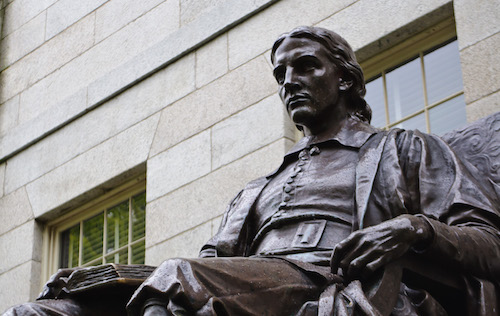 Culture & Ethics
Culture & Ethics
 Evolution
Evolution
 Medicine
Medicine
Somebody to Loathe — Eugenics at Harvard

It’s a cliché that loathing other people is something we do to prop up our own sagging sense of self-worth. Sometimes that’s true, but other times not. A candid and interesting article in Harvard Magazine makes clear that not long ago, the vilest eugenic thinking was a phenomenon at the very uppermost levels of the American elite. I doubt there was any deficit of self-esteem among the men chronicled by Adam S. Cohen in “Harvard’s Eugenics Era.”
Cohen traces the craze for “racial purity” versus “racial suicide” as it made its way across the Atlantic:
Eugenics emerged in England in the late 1800s, when Francis Galton, a half cousin of Charles Darwin, began studying the families of some of history’s greatest thinkers and concluded that genius was hereditary. Galton invented a new word — combining the Greek for “good” and “genes” — and launched a movement calling for society to take affirmative steps to promote “the more suitable races or strains of blood.” Echoing his famous half cousin’s work on evolution, Galton declared that “what Nature does blindly, slowly, and ruthlessly, man may do providently, quickly, and kindly.”
Eugenics soon made its way across the Atlantic, reinforced by the discoveries of Gregor Mendel and the new science of genetics. In the United States, it found some of its earliest support among the same group that Harvard had: the wealthy old families of Boston. The Boston Brahmins were strong believers in the power of their own bloodlines, and it was an easy leap for many of them to believe that society should work to make the nation’s gene pool as exalted as their own.
Oliver Wendell Holmes Sr. — A.B. 1829, M.D. ’36, LL.D. ’80, dean of Harvard Medical School, acclaimed writer, and father of the future Supreme Court justice — was one of the first American intellectuals to espouse eugenics. Holmes, whose ancestors had been at Harvard since John Oliver entered with the class of 1680, had been writing about human breeding even before Galton. He had coined the phrase “Boston Brahmin” in an 1861 book in which he described his social class as a physical and mental elite, identifiable by its noble “physiognomy” and “aptitude for learning,” which he insisted were “congenital and hereditary.”
Holmes believed eugenic principles could be used to address the nation’s social problems. In an 1875 article in The Atlantic Monthly, he gave Galton an early embrace, and argued that his ideas could help to explain the roots of criminal behavior. “If genius and talent are inherited, as Mr. Galton has so conclusively shown,” Holmes wrote, “why should not deep-rooted moral defects…show themselves…in the descendants of moral monsters?”
As eugenics grew in popularity, it took hold at the highest levels of Harvard.
The targets change with time — different races or ethnic groups — but the language enjoys remarkable staying power:
“The human race could be immensely improved in quality, and its capacity for happy living immensely increased, if those of poor physical and mental endowment were prevented from multiplying,” [Harvard economist Frank W. Taussig] wrote [in 1911]. “Certain types of criminals and paupers breed only their kind, and society has a right and a duty to protect its members from the repeated burden of maintaining and guarding such parasites.”
A century ago, the objects of such elite reflections were “negroes,” or “Jews, Italians, Asians, and anyone else who did not share their northern European lineage.” Now, whether rationalized on scientific grounds or not, you are more likely to hear such things (“the repeated burden of maintaining and guarding such parasites”) said about working-class whites. The temptation to revile those “below” you on the social ladder remains evergreen. In fact, reading the article, it’s hard not to be struck by contemporary comparisons, like this to the despised “47 percent” as it was conceived back in the day:
[Harvard psychologist Robert M. Yerkes, A.B. 1898, Ph.D. ’02], who taught courses with such titles as “Educational Psychology, Heredity, and Eugenics” and “Mental Development in the Race,” developed a now-infamous intelligence test that was administered to 1.75 million U.S. Army enlistees in 1917. The test purported to find that more than 47 percent of the white test-takers, and even more of the black ones, were feebleminded…. The 47 percent feebleminded claim was an absurd result unless, as Harvard’s late professor of geology Stephen Jay Gould put it, the United States was “a nation of morons.”
I don’t think there’s anything in evolutionary doctrine per se that inclines it to such invidious thinking. Darwin had his views on which constituted the superior and which the inferior races. But the need to have somebody, some group, to detest is more or less a constant of human nature. Evolutionary-eugenic theory, like other faiths and philosophies, has been obliging in offering to justify hatred on seemingly objective grounds. People can always find other justifications. And they do.
Photo: Statue of John Harvard, by InSapphoWeTrust (Harvard University) [CC BY-SA 2.0], via Wikimedia Commons.
